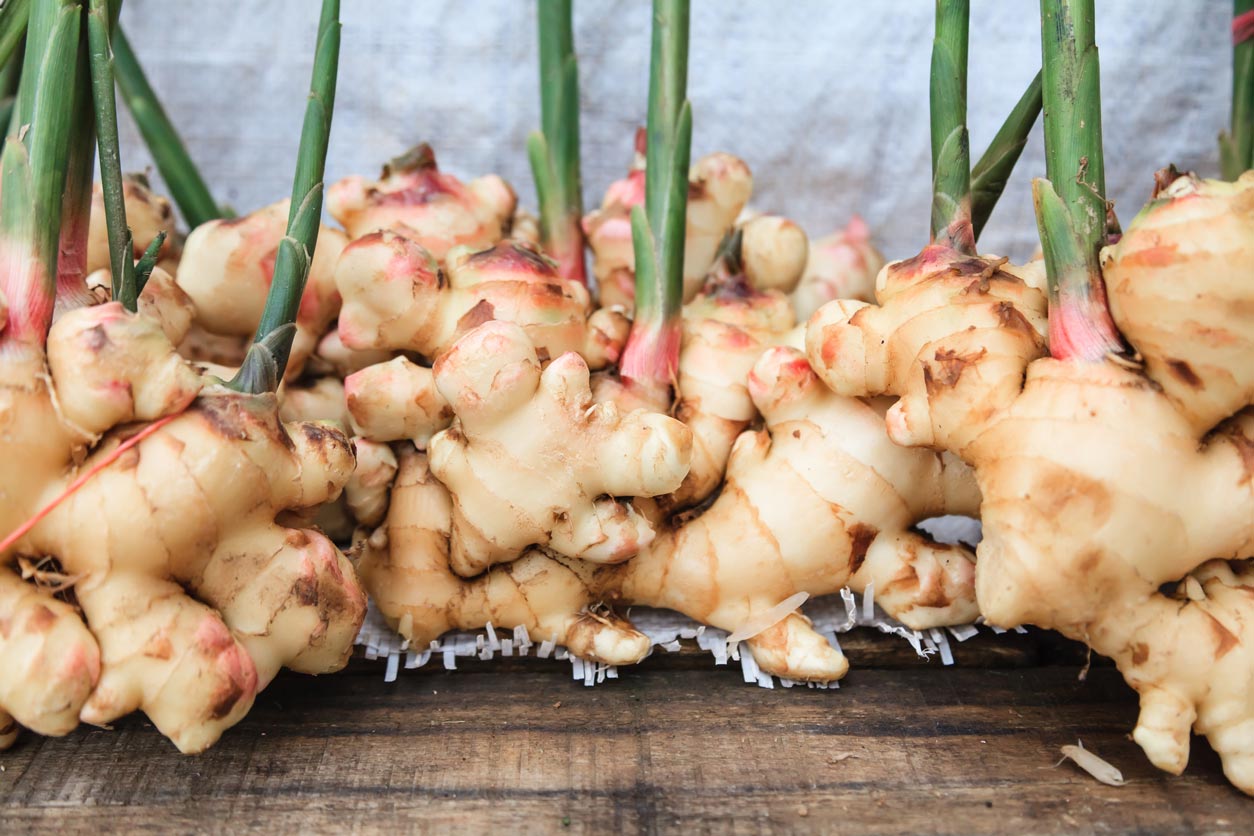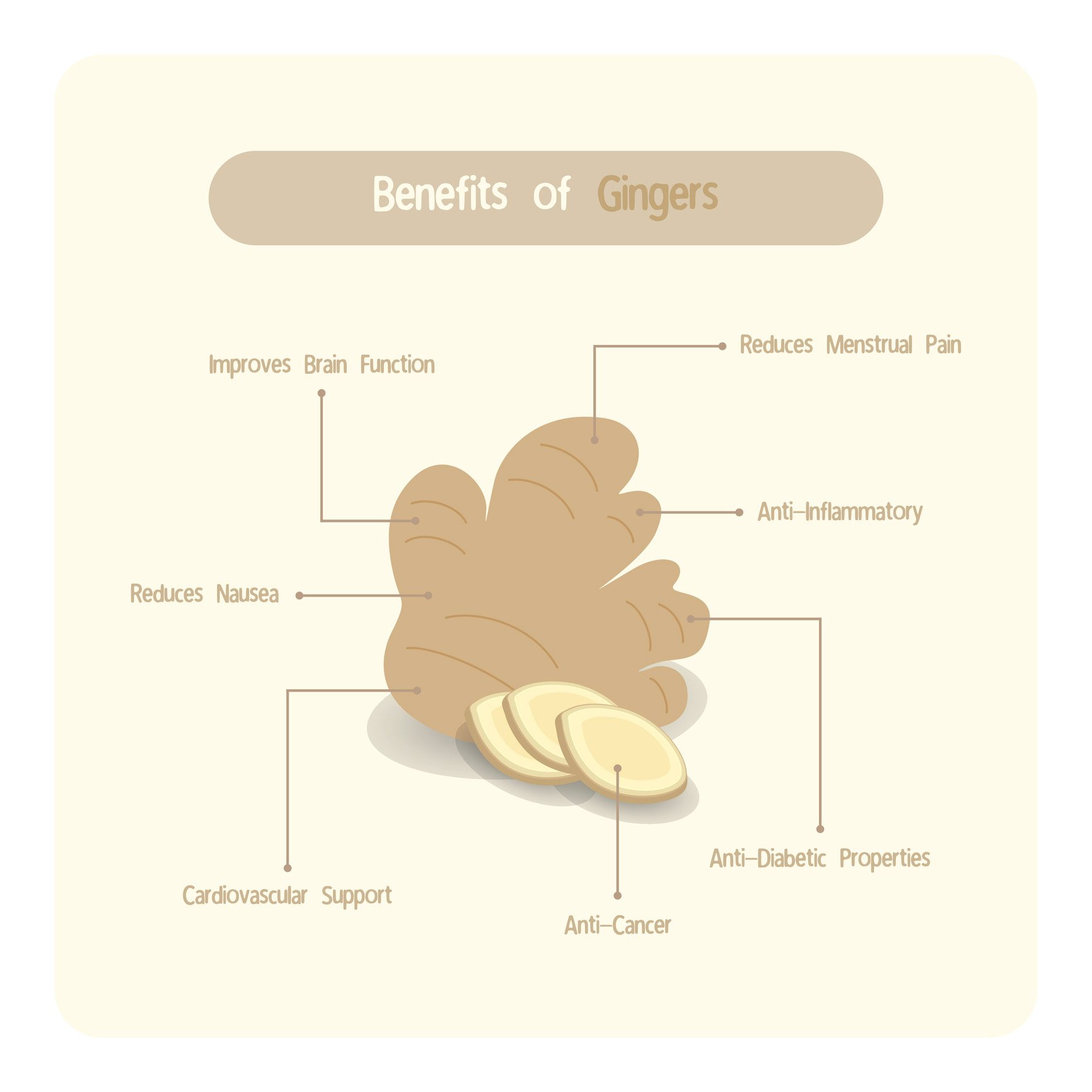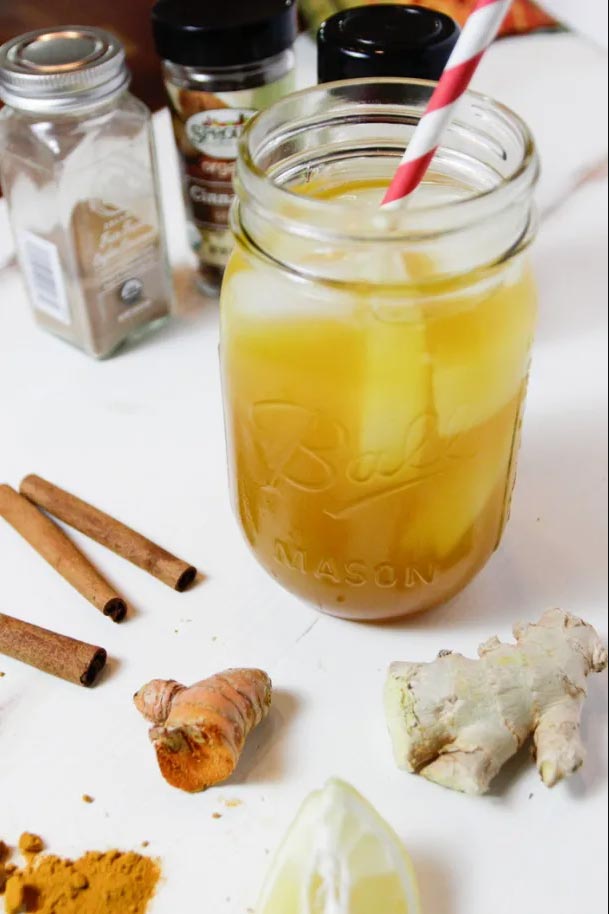Ginger has enjoyed a soaring, global popularity in recent years. No, I’m not talking about redheads — or the name Ginger. These may also be more popular than ever, but here I’m talking about the culinary spice. More and more people are becoming aware of the significant culinary and medical benefits of ginger. In fact, projections for this fragrant spice see its market climbing to $4.18 billion by 2022. But that number might see a significant increase with growing interest in ginger’s potential to support immune health (which is more important than ever right now).
Ancient texts in languages like Sanskrit, Chinese, Greek, Roman, and Arabic mention health-related ginger uses. And ginger has traditionally played a starring role in both Indian Ayurveda and traditional Chinese Medicine. Today, many researchers have studied ginger’s benefits for maladies as different as morning sickness, radiation-mediated inflammation, and migraine headaches.
So what makes ginger so special? How do you use it? And what does the research say about ginger benefits and side effects?
What is Ginger?

Ginger comes from a flowering plant known as Zingiber officinale. But ginger, as we know it and see it in grocery stores and markets, actually refers to the rhizomes or roots of the plant, which is why it’s sometimes called ginger root.
There are over 1,300 species of plants in the Zingiberaceae (ginger plant) family. The spices turmeric, cardamom, and galangal are also in this family. But most varieties of ginger are ornamental, rather than edible.
The most common edible ginger roots are yellowish in color. However, there is also blue ginger, red ginger, and white ginger. And you can sometimes find different species of baby ginger, which are actually the young roots of a ginger plant and are often pink and cream-colored.
Where Does Ginger Come From?
Ginger plants prefer hot weather in tropical or subtropical climates. Most ginger originates in Southeast Asia, where it first grew wild in rainforests. Even though it’s now rare to find uncultivated ginger in Southeast Asia, most of the ginger consumed worldwide still comes from that region. China, India, Nepal, and Thailand are the largest producers of ginger.
Even the US imports nearly all of its ginger from Asia, although ginger does grow in abundance in Hawaii.
Ginger Nutrition Facts
If you’ve ever tasted a piece of fresh ginger, you know that it packs an intense flavor punch. The more mature the ginger root, the stronger the flavor. Because it’s so strong, you don’t need a lot of it to flavor a dish. But when it comes to ginger’s health-boosting properties, a little bit goes a long way.
Ginger is high in vitamins C and B6, along with magnesium, potassium, copper, and manganese. It’s full of both fiber and water, making it good for gut health and weight maintenance. It’s also low in calories and high in phytochemicals — the active compounds in whole plant foods that protect your health.
Most of ginger’s health benefits appear to come from its abundance of polyphenols, which protect the body against oxidative stress. Ginger contains three main polyphenols: gingerols, shogals, and paradols, in addition to being high in antioxidants.
9 Powerful Health Benefits of Ginger

Now that we’ve looked at ginger’s biochemical inventory, let’s dive into what really makes it special: its numerous health benefits.
1. Antiviral
In India and China, using ginger for colds and flus is a popular home remedy that goes back through countless generations. And studies show that these remedies hold up to scientific scrutiny.
Ginger has antibacterial, antifungal, and antiviral properties. Normally, viruses like the common cold, or influenza, enter the body and attach to cells, causing a systemic infection. But ginger has demonstrated the ability to suppress this attachment from occurring and to prevent viruses from continuing to grow within cells.
A study published in The International Journal of Engineering and Science examined herbal remedies used against the swine flu (also called the H1N1 virus). Ginger was one of the top medicinal herbs mentioned for treatment against the swine flu because of its antiviral properties.
And in another study, published in the Journal of Ethnopharmacology in 2013, researchers showed that ginger’s antiviral activities helped fight a common respiratory tract infection called human respiratory syncytial virus (HRSV). Both fresh and dried ginger were prepared in hot water and lab-tested on human respiratory cells. While dried ginger did not have much of an effect, fresh ginger was able to prevent the virus from taking hold of the cells.
2. Anticancer
Gastrointestinal cancers are among the most common and lethal types of cancer in the world. But a 2015 review showed how ginger had been used to both prevent and reverse gastrointestinal cancers. Test tube, animal studies, and human studies all suggested that ginger suppresses the growth of cancer cells and, in fact, causes them to self-destruct (a process known as apoptosis). Ginger could even enhance the anticancer effects of a chemo drug, 5-fluorouracil, which may encourage further human studies on its use as a cost-effective, complementary cancer treatment.
3. Antiemetic
Perhaps ginger’s most well-known health benefit is its effectiveness against nausea and vomiting. In many countries, especially China and India, a ginger tonic or tea has been given to help calm digestive discomfort and disorders for thousands of years. It’s thought that the polyphenols gingerol and shogal are responsible for ginger’s stomach-settling effects.
However, there are also over thirty years of research dedicated to this particular application of ginger. Multiple studies show its effectiveness against nausea and vomiting, especially in relation to both pregnancy and chemotherapy.
In studying ginger’s effects on chemotherapy-induced nausea and vomiting, a double-blind cancer patient trial reported significant reduction in acute nausea. Participants received either a placebo, half a gram of ginger, one gram of ginger, or one and a half grams of ginger. All patients who received any of the ginger doses, at all three levels tested, found nausea relief.
4. Treats and Prevents Harmful Gut Bacteria
In addition to helping with nausea, ginger also aids gut health by targeting certain bacteria with its potent antibacterial activity. A recent 2019 study in Advanced Pharmaceutical Bulletin concluded the use of ginger was helpful in treating functional dyspepsia as a result of the bacteria H. pylori. In addition to easing or eliminating uncomfortable symptoms, ginger therapy completely eradicated the harmful gut bacteria in half of the test subjects. That’s a big deal, considering H. pylori is notoriously difficult to get rid of.
5. May Protect Against Radiation
Radiation is a commonly used cancer treatment that has some very problematic side effects. One of them is that it increases oxidative stress within the body and can harm internal organs. In an effort to mitigate these side effects, a none-too-kind animal study, performed in 2017, explored whether ginger might work as an anti-inflammatory and antioxidant agent in the body.
In the study, ginger extract was given to rats as a pretreatment before radiation exposure. The rats who received this treatment saw protection against kidney damage and reduced inflammation. The researchers recommended ginger extract over synthetic radioprotective compounds because of its lack of harmful side effects.
6. Pain Reliever
Ginger also works as a multi-faceted pain reliever. In an earlier article published on our site, Dr. Michael Greger examined ginger’s use as an alternative to the migraine drug sumatriptan. The results found ginger worked equally as well, but with fewer side effects. Plus, it’s a lot cheaper!
Ginger has also received acclaim as a natural pain reliever for menstrual cramps. A randomized, controlled trial on 120 female Iranian students with moderate to severe menstrual cramps tested the effects of ginger to see if it would help. The students received either 500mg of ginger powder in capsule form or a placebo three times a day. They further split into groups that received the treatment either two days prior to menstruation plus the first three days, or the first three days only. In both cases, where ginger was given, there was a significant reduction in pain, compared to the women who took the placebo.
Because it works as an anti-inflammatory, ginger also shows promise for muscle and joint pain. One study showed that the daily consumption of heat-treated ginger relieved exercise-induced muscle pain. And other studies have examined ginger’s effect on osteoarthritis, a painful degenerative joint disorder, with moderate but promising results.
7. Could Help Balance Blood Sugar
Ginger might also have value in supporting blood glucose control. A 2019 analysis of multiple research studies showed how ginger consumption impacts HbA1c levels (glycated hemoglobin). Patients with type 2 diabetes saw a significant improvement in these levels while taking ginger, suggesting that ginger could have a long-term positive impact on blood sugar balance.
8. Cardioprotective Benefits
Can a spice fight the world’s #1 killer, cardiovascular disease? Research on ginger’s ability to protect the heart is ongoing and promising.
An Iranian meta-analysis and review of studies on ginger and heart disease found a marked decrease in both systolic and diastolic blood pressure from ginger supplementation. And a cross-sectional study conducted by Chinese researchers evaluated the level of ginger intake amongst participants with various chronic diseases. They found that daily ginger consumption decreased the risk of both hypertension and coronary heart disease. Maybe we should start saying, “A dose of ginger a day keeps the heart doctor away”!
9. Neuroprotective
Neurologists and husband and wife team, Drs. Dean and Ayesha Sherzai, conducted research showing that up to 90% of Alzheimer’s cases may be preventable through diet and lifestyle. Well, now it seems that ginger might be one of those neuroprotective foods you’ll want to add to your diet. In-vitro tests using one of the bioactive compounds found in ginger, gingerol, showed potential anti-inflammatory effects by acting on cells that essentially turn on cells and proteins within the brain that cause neuroinflammation.
5 Potential Side Effects of Ginger

Although the benefits of ginger outweigh potential side effects for most of us, there are still a few instances that call for caution.
1. Gastrointestinal Discomfort
Recommended doses of ginger and those amounts used in clinical trials are usually between 170mg to one gram of powdered ginger per day. Studies show that consumption of more than six grams of powdered ginger at a time can cause gastrointestinal symptoms such as diarrhea, heartburn, and upset stomach. But you’d have a hard time eating that much powdered ginger outside of capsule form, anyway. While a tablespoon of ground ginger weighs about six grams ― that’s equivalent to about ⅔ cup of fresh ginger.
So if you do decide to consume a lot of ginger, you might not want to go above ⅔ cup of fresh ginger, or three teaspoons of ginger powder, per day. And frankly, if you did decide to eat that much, I’d have to wonder about your tastebuds. Because ginger is, after all, a spice!
2. Allergic Reactions
As with almost any food, allergic reactions to ginger are possible. While uncommon, a possible external allergy symptom to ginger is contact dermatitis or eczema. There are also cases of allergic reactions to ginger dust, such as that from powdered ginger. However, no skin prick test currently exists to test for ginger allergies. If you think you might be allergic, the best course of action is to avoid ginger.
3. Can Prolong Bleeding
Warfarin is an anticoagulant (blood-thinning) drug given to people with known concern about blood clots and before certain surgeries. Research suggests that some foods, including ginger, potentiate the effects of warfarin and increase the risk of bleeding during surgical procedures. According to the Cleveland Clinic, though, small amounts of ginger (think seasoning, not a major component of your diet) should be fine.
4. Central Nervous System Depression and Arrhythmia
Although ginger’s blood pressure-lowering effect is beneficial to some people, in others, it can cause blood pressure to drop too low. In both animal and human studies, ginger caused central nervous system depression and arrhythmia among a small number of individuals.
5. May Aggravate Gallbladder Disease
Research shows that ginger increases bile secretion, which might contribute to gallstone formation in some people. If you have gallbladder disease, it’s recommended you use caution when consuming ginger, and discuss its usage with your doctor.
Where to Find Ginger

In addition to fresh ginger root and powdered ginger, you might also find pickled ginger, ginger tea, dried or preserved ginger, and candied ginger (which, as you might guess, is prepared with lots of sugar!). Under normal circumstances, ginger and ginger products are readily available at most grocery stores, food co-ops, and markets. However, because of ginger’s wide variety of health benefits, including its immune-supporting powers, demand is high. And you may not be able to find it as easily as you normally might.
If you can’t find fresh or powdered ginger at the grocery stores you normally shop at, you can also try other ginger products like ginger tea or pickled ginger. Asian and Indian markets are also a good bet for ginger and ginger products, or you can try searching online via Amazon or Thrive Market.
Grow Your Own Ginger
In order to increase food security during these uncertain times, many people are also turning to edible gardening and growing their own food. Ginger is easy to grow from rhizome pieces you already have, or you can order “seeds,” which are really just young ginger pieces.
As mentioned earlier, ginger likes hot, tropical, and subtropical environments. So, if you live in a place with warm winters, you should have no problem growing ginger outdoors year-round. In many other places, you might be able to grow ginger during the summer months, provided temperatures don’t drop below 55℉ at night.
Ginger likes partial shade and can be planted directly in the ground or in a pot. But if you do live in a colder region, you might want to consider potted ginger in order to continue growth indoors when it gets cold. You might also be able to grow it in a greenhouse if you have access to one.
For full instructions and advice on how to grow ginger, check out this guide by Gardener’s Path.
How to Pick and Store Ginger
Like any fruit or vegetable, ginger root can go bad if not stored properly. This is also good to keep in mind when you pick out fresh ginger at the store. When shopping for fresh ginger, look for roots that have shiny skin without any wrinkles or soft spots. And obviously, if you see signs of mold or other discoloration, that’s a sign that you’re looking at a piece of ginger that’s a no-go.
Fresh ginger is a root, and you can store it in a cool, dark place like other root vegetables. Typically, it stays fresh this way for about a week before it starts to get wrinkly looking. At that point, or if you cut it before then, you can store it in the refrigerator or freezer. In the fridge, use a resealable bag in the crisper drawer. It should last for up to a month in the refrigerator. If storing in the freezer, make sure to cut it into smaller pieces, about one to two inches long, and peel them. It’s much harder to peel ginger after freezing. Frozen ginger can last for up to six months.
A cool benefit (no pun intended) of frozen ginger is that it grates much more easily than fresh ginger. The “strings” that can gum up a regular grater or mandoline simply snap off when the ginger is frozen.
As for other types of ginger like powdered, dried, and ginger teas, most store well in a cool, dark place. Pickled ginger can go in the refrigerator once you open it. These types of ginger are less likely to go bad, but they may lose some of their spiciness over time.
Ginger Uses
There are lots of different ways to use ginger in cooking and baking. Some of the most popular ways to use ginger include:
- Indian curries
- Thai, Chinese, Vietnamese, Korean, and Japanese dishes or condiments
- Soups
- In a juice or smoothie
- In baked goods
- In breakfast foods like oatmeal, overnight oats, and chia puddings
- In sauces and dressings
- Teas and medicinal drinks
Ginger Recipes to Try at Home
Here are just a couple of ginger-featuring recipes that are sure to spice up your life!

Coconut Ginger Carrot Soup by Running on Real Food
This nourishing soup uses carrots and coconut milk for a base. And in addition to ginger, it’s spiced with the power of other immunity strengtheners like garlic, onion, cumin, and coriander. If you don’t have access to fresh ginger at the moment, you can use ¼ teaspoon of ground ginger for every tablespoon of fresh.
Easy Thai Ginger Collard Green Wraps by The Glowing Fridge
Need a fun way to eat your greens and get a healthy dose of ginger? Try making these Thai ginger collard wraps. The filling includes veggies like broccoli, zucchini, scallions, and mushrooms, along with protein-packed tempeh that are all stir-fried together. You can easily go oil-free by water sauteing the veggies. And be sure to go organic when possible with the zucchini, broccoli, and tempeh to avoid GMOs.

Turmeric Ginger Iced Tea by Plant-Based Cooking
This iced tea doesn’t actually use any tea leaves but instead is made by boiling ginger, turmeric, and cinnamon in water. All three spices are great for your immune system and pack a triple anti-inflammatory punch. Try it with the suggested maple syrup if you like or leave it out to keep things spicier rather than sweet.
Should You Add Ginger to Your Diet?
The use of ginger, both culinarily and medicinally, spans thousands of years and across many cultures. But now, in a time when immune system health is on so many people’s minds, its benefits may be more important than ever. Studies tell us that it could bring down inflammation, fight pain (including migraines), prevent cancer, support digestive health, balance blood sugar, and enhance your immune system. Plus, it tastes pretty good, too!
Have you made friends with ginger? If not, this might be a good time to give it a try.
Tell us in the comments
- Do you use ginger?
- Were you aware of ginger’s benefits and side effects?
- How do you best like to use ginger in cooking?
Featured Image: iStock.com/gerenme

